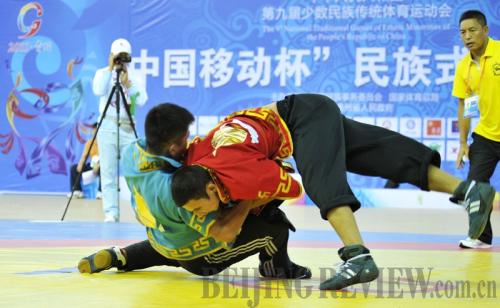|
 |
|
VYING FOR THE GOLD: Athletes from the Xinjiang Autonomous Region compete in an Uygur-style wrestling competition during the ninth Chinese National Ethnic Games held in the city of Guiyang, capital city of Guizhou Province, from September 9 to 18 (SHI GANG) |
Cultural exhibitions
The National Ethnic Games, initially launched in 1953, have evolved into one of the influential traditional national sporting events with its own distinct characteristics. The games form a special and fairly fixed pattern involving opening and closing ceremonies, events contests and performing programs, and a celebratory gala.
The games mascot Yuanyuan is based on a dragon-shaped fossil, unique to Guizhou. The emblem of the event is an artistic sculpture shaped like a "9," based on a horn shape that ethnic groups in the province once worshipped. The number nine in Chinese is pronounced jiu, and signifies "eternity" in Chinese culture.
The two-part opening ceremony on September 9 carried the themes "Splendid China" and "Colorful Guizhou," and combined special characteristics of China's 56 nationalities with Guizhou's original ecological culture.
The celebratory gala was held at Guanshan Lake Park in Guiyang, where nine gates of different architectural styles were established to welcome the guests, along with a traditional banquet.
The closing ceremony on September 18 took place within an atmosphere of humanities, nature and carnival, with a performance showing a full moon, representing unity and happiness.
Feng Jianzhong, vice chairman of the organizing committee of the ninth National Ethnic Games, as well as vice minister of the State Commission for Ethnic Affairs, said the games are meant to spread the splendid culture of minority ethnic groups and promote unity and communication between various minority ethnic groups. "Combining sports with culture is an important feature of the games," he said.
Protection
A symposium on ethnic sports science was held during the event. Scholars from sport and education sectors noted that efforts should be strengthened to discover more traditional ethnic sports and step up preservation of sporting heritage, for it is a part of traditional culture.
Many sports for performance showcased during the games are foremost examples of intangible cultural heritage, including 16 performances from Yunnan Province, home to more than 300 types of performance sports, according to Mu Zhen, vice director of the Yunnan Commission for Ethnic Affairs.
Yunnan led the country in 2000 to work out China's first initiatives to protect intangible cultural heritage, laying a good foundation for the province to protect its customs and traditions. The province set up institutions in all prefectures to manage and protect local traditional sports and culture, and held frequent sporting events to preserve old athletic traditions and promote new ones.
Local members of ethnic groups often make use of various celebrations to develop traditional sports tourism to attract visitors to areas like Diqing, Xishuangbanna and Chuxiong in Yunnan, said Mu. "Therefore, these traditional sports games featuring local ethnic traits have become interesting games for tourists to experience local customs," Mu said. | 